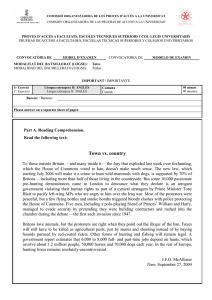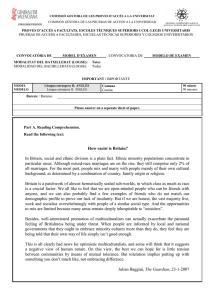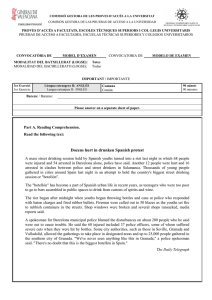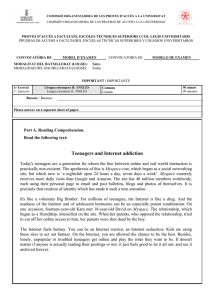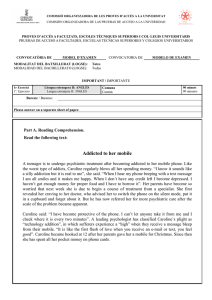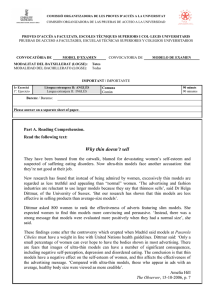Climate change is linked to mass extinctions of the past
Anuncio
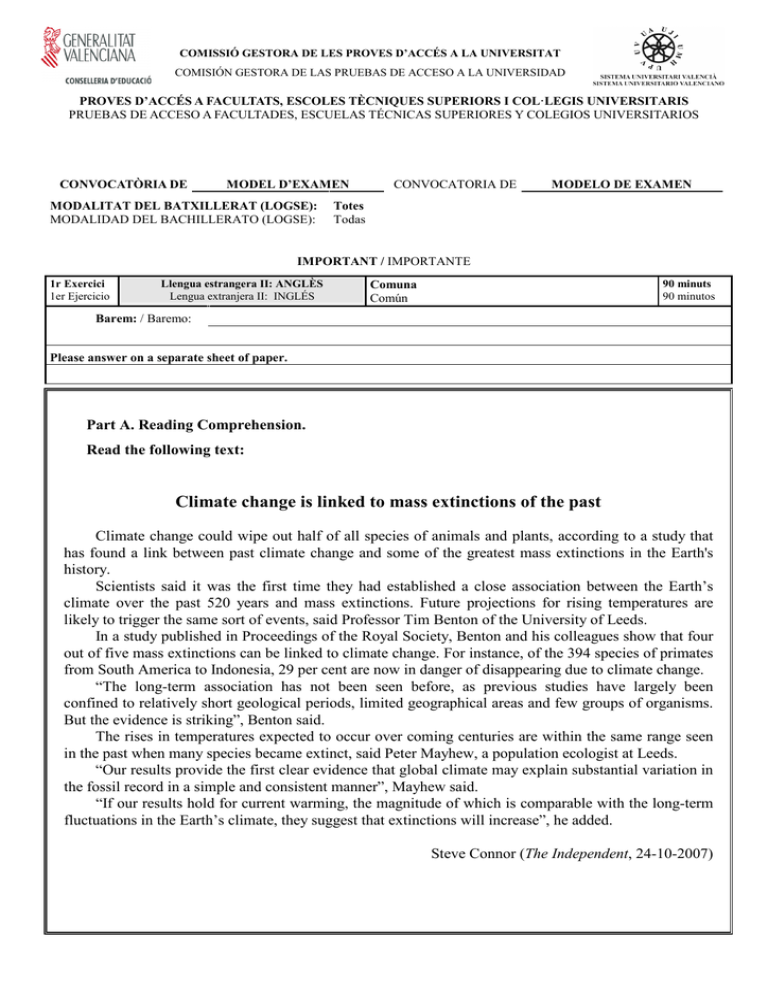
COMISSIÓ GESTORA DE LES PROVES D’ACCÉS A LA UIVERSITAT COMISIÓN GESTORA DE LAS PRUEBAS DE ACCESO A LA UNIVERSIDAD PROVES D’ACCÉS A FACULTATS, ESCOLES TÈCIQUES SUPERIORS I COL·LEGIS UIVERSITARIS PRUEBAS DE ACCESO A FACULTADES, ESCUELAS TÉCNICAS SUPERIORES Y COLEGIOS UNIVERSITARIOS COVOCATÒRIA DE MODEL D’EXAME MODALITAT DEL BATXILLERAT (LOGSE): MODALIDAD DEL BACHILLERATO (LOGSE): CONVOCATORIA DE MODELO DE EXAME Totes Todas IMPORTAT / IMPORTANTE 1r Exercici 1er Ejercicio Llengua estrangera II: AGLÈS Lengua extranjera II: INGLÉS 90 minuts 90 minutos Comuna Común Barem: / Baremo: Please answer on a separate sheet of paper. Part A. Reading Comprehension. Read the following text: Climate change is linked to mass extinctions of the past Climate change could wipe out half of all species of animals and plants, according to a study that has found a link between past climate change and some of the greatest mass extinctions in the Earth's history. Scientists said it was the first time they had established a close association between the Earth’s climate over the past 520 years and mass extinctions. Future projections for rising temperatures are likely to trigger the same sort of events, said Professor Tim Benton of the University of Leeds. In a study published in Proceedings of the Royal Society, Benton and his colleagues show that four out of five mass extinctions can be linked to climate change. For instance, of the 394 species of primates from South America to Indonesia, 29 per cent are now in danger of disappearing due to climate change. “The long-term association has not been seen before, as previous studies have largely been confined to relatively short geological periods, limited geographical areas and few groups of organisms. But the evidence is striking”, Benton said. The rises in temperatures expected to occur over coming centuries are within the same range seen in the past when many species became extinct, said Peter Mayhew, a population ecologist at Leeds. “Our results provide the first clear evidence that global climate may explain substantial variation in the fossil record in a simple and consistent manner”, Mayhew said. “If our results hold for current warming, the magnitude of which is comparable with the long-term fluctuations in the Earth’s climate, they suggest that extinctions will increase”, he added. Steve Connor (The Independent, 24-10-2007) COMISSIÓ GESTORA DE LES PROVES D’ACCÉS A LA UIVERSITAT COMISIÓN GESTORA DE LAS PRUEBAS DE ACCESO A LA UNIVERSIDAD PROVES D’ACCÉS A FACULTATS, ESCOLES TÈCIQUES SUPERIORS I COL·LEGIS UIVERSITARIS PRUEBAS DE ACCESO A FACULTADES, ESCUELAS TÉCNICAS SUPERIORES Y COLEGIOS UNIVERSITARIOS COVOCATÒRIA DE MODEL D’EXAME MODALITAT DEL BATXILLERAT (LOGSE): MODALIDAD DEL BACHILLERATO (LOGSE): CONVOCATORIA DE MODELO DE EXAME Totes Todas IMPORTAT / IMPORTANTE 1r Exercici 1er. Ejercicio Llengua estrangera II: AGLÈS Lengua extranjera II: INGLÉS 90 minuts 90 minutos Comuna Común Barem: / Baremo: Please answer on a separate sheet of paper. I. Answer the following questions using your own words but taking into account the information in the text (2 points: 1 point each) a. Why hadn’t the link between climate change and mass extinctions been found before? b. Can rising temperatures lead to another mass extinction? Why? II. Are the following statements true (T) or false (F)? Identify the part of the text that supports your answer by copying the exact passage on the answer sheet (1.5 point: 0.5 each) a. Twenty-nine per cent of the species of primates have disappeared due to climate change. b. The temperatures expected for the future resemble the ones that led to extinctions in the past. c. Climate change may explain how fossils have changed in history. III. Find a synonym for each of the four words below from these six options: (1 point: 0.25 each) wipe out a. b. c. d. increasing destroy provoke surprising close rising trigger striking fluctuations COMISSIÓ GESTORA DE LES PROVES D’ACCÉS A LA UIVERSITAT COMISIÓN GESTORA DE LAS PRUEBAS DE ACCESO A LA UNIVERSIDAD PROVES D’ACCÉS A FACULTATS, ESCOLES TÈCIQUES SUPERIORS I COL·LEGIS UIVERSITARIS PRUEBAS DE ACCESO A FACULTADES, ESCUELAS TÉCNICAS SUPERIORES Y COLEGIOS UNIVERSITARIOS COVOCATÒRIA DE MODEL D’EXAME MODALITAT DEL BATXILLERAT (LOGSE): MODALIDAD DEL BACHILLERATO (LOGSE): CONVOCATORIA DE MODELO DE EXAME Totes Todas IMPORTAT / IMPORTANTE 1r Exercici 1er. Ejercicio Llengua estrangera II: AGLÈS Lengua extranjera II: INGLÉS Comuna Común 90 minuts 90 minutos Barem: / Baremo: Please answer on a separate sheet of paper. IV. Choose a, b, or c, in each question below. Only one choice is correct (1.5 points: 0.5 each) 1. It is the first time that... a) a connection has been found between climate and extinctions, but only in the past 520 years although it is an unlikely connection in the future. b) a connection has been found between climate and extinctions in the past 520 years and it is a probable connection in the future. c) a connection has been found between climate and extinctions in the past 520 years, but it is only applicable to limited geographical areas. 2. The expected rises in temperatures for the coming centuries... a) are within the same geographical area. b) are the same as the ones that led to extinctions in the past. c) are similar to the ones that led to extinctions in the past. 3. The results of the study... a) prove that extinctions will increase in the future. b) indicate that extinctions are more likely in the future. c) suggest that extinctions will take place in the next 520 years. Part B. Composition (130-150 words approximately). Choose one of the following topics (4 points) 1. Do you think rising temperatures can influence animal life? Why? Give reasons. 2. What can we do to prevent global warming in the future?
